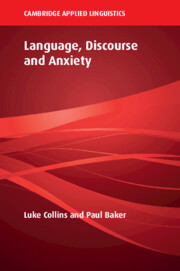Book contents
- Language, Discourse and Anxiety
- THE CAMBRIDGE APPLIED LINGUISTICS SERIES
- Language, Discourse and Anxiety
- Copyright page
- Contents
- Figures
- Tables
- Acknowledgements
- Preface
- 1 Anxiety, Online Fora and This Study
- 2 Sketching Anxiety
- 3 The Lived Experience
- 4 Creating a Community
- 5 Sex and Gender
- 6 Comparing Cultures
- 7 Time
- 8 Conclusion
- References
- Index
7 - Time
Published online by Cambridge University Press: 08 June 2023
- Language, Discourse and Anxiety
- THE CAMBRIDGE APPLIED LINGUISTICS SERIES
- Language, Discourse and Anxiety
- Copyright page
- Contents
- Figures
- Tables
- Acknowledgements
- Preface
- 1 Anxiety, Online Fora and This Study
- 2 Sketching Anxiety
- 3 The Lived Experience
- 4 Creating a Community
- 5 Sex and Gender
- 6 Comparing Cultures
- 7 Time
- 8 Conclusion
- References
- Index
Summary
This chapter takes advantage of the fact that our corpus contains posts made over an eight-year period, along with the demographic information we have about patient age. We consider diachronic aspects of the forum in a range of ways. First, we look at how language has changed over the time, focusing on changes in anxiety discourses. We consider the corpus in terms of trends over the eight-year period. We also consider how the age of posters impacts on the ways they write about language, dividing the corpus into age-graded sections. We compare linguistic differences across these age groups, seeking to identify how language use reflects different understandings or representations of anxiety in relationship to age. Finally, we trace how posting behaviour ‘evolves’ over time; for example, early posts involve narrative histories, question seeking and expressions of emotional state whereas later ones involve advice-giving and expressions of affiliation as posters take on the role of ‘expert’. We also consider how participants leave the forum by looking at ‘final posts’. In what ways, if at all, do posters provide a sense of narrative ‘closure’ when they leave the group?
Information
- Type
- Chapter
- Information
- Language, Discourse and Anxiety , pp. 191 - 227Publisher: Cambridge University PressPrint publication year: 2023
